Expert List Organic Farming
Organic farming is increasingly popular among consumers; so much so that domestic farmers have difficulties satisfying the demand for organically grown products. Hohenheim experts answer questions on organic farming, animal husbandry, and organic products.
Organic crop production
Coordination of research on organic farming at the University of Hohenheim
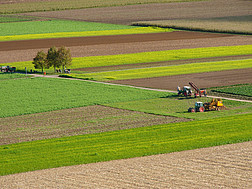
Research on organic farming at the University of Hohenheim is coordinated by Dr. Sabine Zikeli. She is your point of contact for all questions about organic farming. As expert in soil science and plant nutrition, she is involved in various interdisciplinary research projects in the organic farming sector.
Contact: Dr. Sabine Zikeli, Co-ordination for Organic Farming and Consumer Protection, +49 711 459 23248, E-mail
Innovative crop protection strategies in organic farming
Insects can also cause great damage in organic crop production. Which possibilities are there for biological pest control? What innovative crop protection strategies make sense? What are the actual interactions between plants and insects? Entomologist Prof. Dr. Georg Petschenka conducts research on these issues and is available for interviews.
Contact: Prof. Dr. Georg Petschenka, Department of Applied Entomology, +49 711 459 22400, email
Biological pest control for plants
Organic farming has a long tradition of biological pest control, restricting the use of chemicals to a very limited number of materials such as sulphur or copper. In greenhouses, biological pest control has been practiced successfully for a very long time; outdoors, by contrast, it has so far been possible only to a limited degree. Prof. Dr. Ralf Vögele and his team examine new potential counterparts in a broad spectrum of applications.
Contact: Prof. Dr. Ralf T. Vögele, Deaprtment of Phytopathology, +49 711 459 22387, E-mail
Artificial intelligence: Digitalization for organic farming
Artificial intelligence (AI) is also benefiting organic farming: It allows autonomous robots or intelligent attachments to detect weeds and control them mechanically with the utmost precision - and only if this is necessary at all from an agronomic point of view. Or plant diseases can be detected at early stages of infection using AI-based analysis of spectral images (machine vision). AI also enables crop yield prediction based on satellite imagery combined with weather and crop development data, as well as historical yields. Jun.-Prof. Dr. Anthony Stein explains the possible applications in organic farming, the technology behind it, and the opportunities that are associated with it with a view to sustainability.
Contact: Jun.-Prof. Dr. Anthony Stein, Department of Artificial Intelligence in Agricultural Engineering, +49 711 459 22532, email
Einkorn - emmer - spelt: Traditional wheats in organic farming
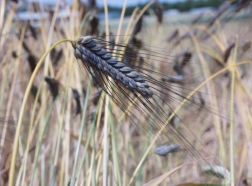
The old wheats einkorn, emmer, and spelt are of special interest to organic farmers. PD Dr. Friedrich Longin is an expert on these old wheats. He prepares practical recommendations for growing them and studies the nutritional value of old wheats. Together with his team, he studies the nutrients they contain (e.g., carotinoids, vitamin E, and certain proteins) with regard to intolerances (gluten, ATI). Furthermore, Dr. Longin and his team examine the qualities of old wheats when used for baking.
Contact: Prof. Dr. Friedrich Longin, State Breeding Institute – Wheat Department, +49 711 459 23846, E-mail
Soy beans, lupin beans, and lentils: Proteins from plant seeds
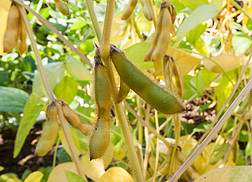
Protein plants are an essential ingredient in animal feeds, especially in organic farming. But plant proteins are also higly important in human nutrition, especially for vegetarians. Prof. Dr Christian Zörb is doing research on growing soy beans in the temperate climate zones of Europe. Soy beans and lupin beans are especially suitable for organic farming because of their ability to fix atmospheric nitrogen and transform it into storage proteins. Moreover, they are resistant to many pests and germs.
Contact: Prof. Dr. Christian Zörb, Department of Quality of Plant Products, +49 (0) 711 459 22520, E-mail
New soybean varieties also grow in cold weather
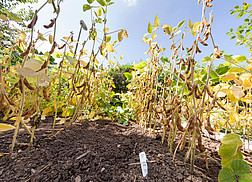
Soy is an immensely important crop in organic farming; demand is rising for use both as animal feed and for human consumption as soy milk or tofu, for example. But soy beans love warm weather, which is why growth in Germany is still limited to a handful of warmer regions. Plant breeding offers new opportunities for growing more soy for the domestic market: Dr. Volker Hahn and his team are busy breeding soybean varieties that will also grow under climactic conditions in Germany.
Contact: Dr. Volker Hahn, State Breeding Institute (LSA) - Sunflower and Leguminous Crops Department, +49 7852 918817, E-mail
Soils serving as storage reservoirs, filters, and buffers: The role of microorganisms
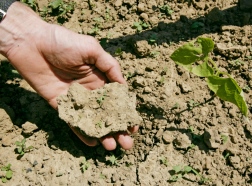
Soils play a very important role as storage reservoirs, filters, and buffers: For example, they regulate the emission of greenhouse gases and determine whether pesticides are accumulated or washed out. Prof. Dr. Ellen Kandeler is an expert on soil biology at the Institute of Soil Science and Land Evaluation. Her research is on the role of microorganisms in these processes.
Contact: Prof. Dr. Ellen Kandeler, Department of Soil Biology, +49 711 459 24220, E-mail
Organic methods to fight storage pests
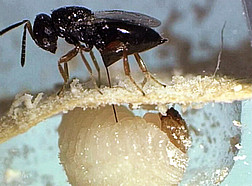
Organic farmers are restricted by regulations to using only natural pesticides. This also applies to storing their products. To address the problem of storage pests, therefore, they need environmentally friendly methods for fighting them. Prof. Dr. Johaness Steidle is doing research in this area. His focus is on the biological control of storage pests such as grain weevils and bean weevils by releasing ichneumon wasps.
Contact: Prof Dr. Johannes Steidle, Department of Animal Ecology, +49 711 459 23667, E-mail
Organic fruit and vegetable farming
Open field tomatoes in organic farming
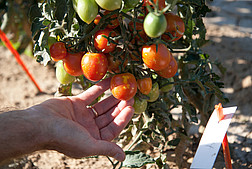
Tomatoes are mostly grown in greenhouses. This creates relatively high costs. Growing tomatoes in the open field is a cost-effective production method for organic farmers. Prof. Dr. Christian Zörb tests traditional and new varities for their suitability. His studies focus on resilience, yield, and quality.
Contact: Prof. Dr. Christian Zörb, Department of Quality of Plant Products, +49 711 459 22520, E-mail
Traditional onion varities in organic farming
Old onion varities play an important role with regard to genetic diversity. Although they do not necessarily produce better results in terms of resilience to diseases or yield, they offer a broad genetic basis for interesting and health-promoting secondary plant substances. This is why Prof. Dr. Christian Zörb studies these substances in traditional and new onion varities.
Contact: Prof. Dr. Christian Zörb, Department of Quality of Plant Products, +49 711 459 22520, E-mail
Economy and Politics
Policy modeling: What is the impact of promoting organic farming?
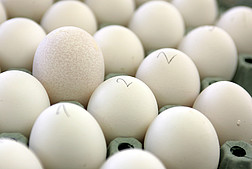
What are the effects of policies that specifically promote organic agriculture? How do market prices, trade, and household incomes change on the one hand? On the other hand, what are the interrelationships between ecology and economy? Jun.-Prof. Dr. Arndt Feuerbacher uses ecological-economic policy modeling to get to the bottom of these questions.
Contact: Jun.-Prof. Dr. Arndt Feuerbacher, Department of Ecological-Economic Policy Modeling, +49 711 459-24672, email
